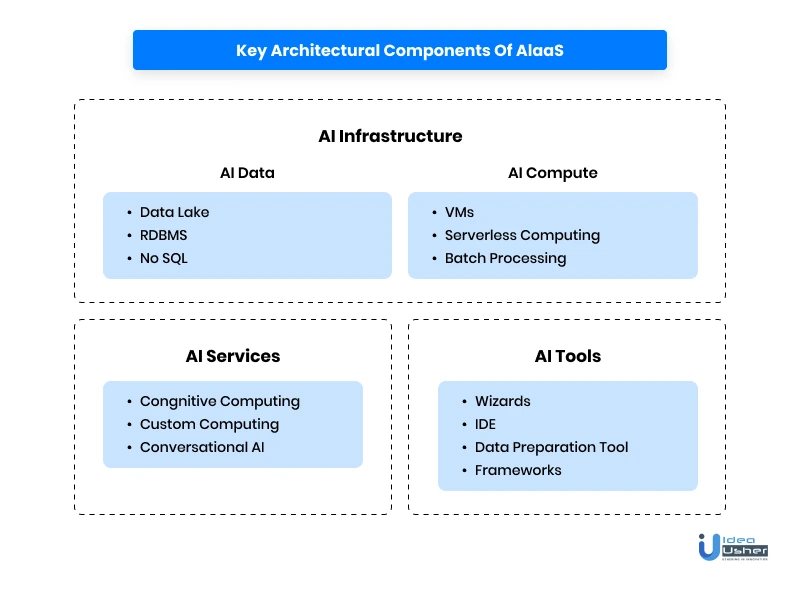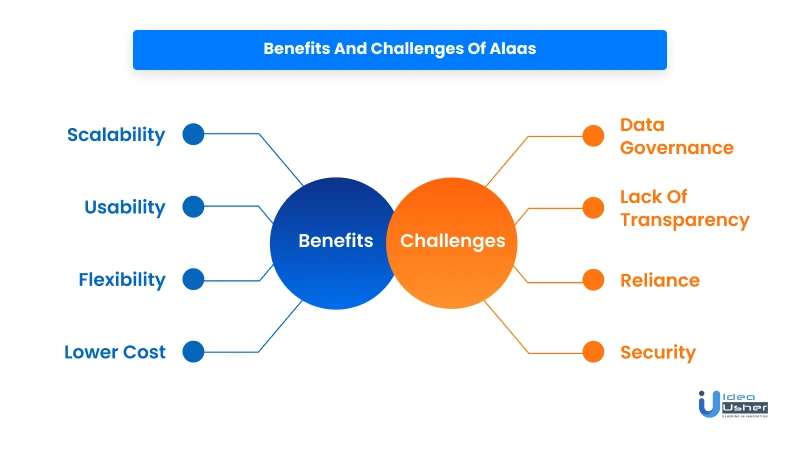
Artificial Intelligence as a Service, or AIaaS, is a newer idea in the IT industry compared to other “as a service” offerings like software and infrastructure. Outsourcing AI to a third party is what we call Artificial Intelligence as a Service (AIaaS). But is it beneficial to small businesses? – With AI as a service, businesses and individuals may explore the capabilities of AI for a wide range of uses without making a significant financial or time commitment upfront. As a result, many SMBs can now afford to use AI for customer care, data analysis, and production automation; this is a massive boon for the corporate world.
Are you ready to start with AIaaS?
AI Is Big Business
The International Data Corporation (IDC) forecasts that by 2024, global expenditure on artificial intelligence will have increased from the $50.1 billion invested in 2020 to more than $110 billion. If we go back any further, we see that spending in 2017 was a mere $12 billion. Consequently, worldwide expenditures have escalated in recent years. In the years between 2021 and 2025, the global market for AIaaS is expected to expand by $14.7 billion, as reported by Technavio.
Many entities, not just large businesses, are contributing to this activity. Flexera has published research on the widespread implementation of AI :
- A total of 28% of companies are now testing out AI/ML.
- Nearly half of businesses (46%) are already experimenting with AI/ML or intend to do so soon.
- Enterprises are experimenting the most with AI and ML.
Key Architectural Components Of AIaaS

1. AI Infrastructure
Specifically, it strengthens the frameworks of AI and ML. These models rely heavily on data and computation.
1.1. AI Data
A functional ML model is developed when vast amounts of data are applied to statistical techniques. These models have been created with the specific goal of discovering hidden insights within the available data. How precise these forecasts depend on the sheer quantity of available data. Input data, which can come from various places, is crucial to ML.
1.2. AI Compute
The term “AI compute services” refers to a broad category that includes serverless computing, batch processing, and virtual machines (VMs). By using these computational strategies, we can improve parallel processing and automate ML activities. For instance, the Apache Spark data processing engine features a modular machine learning framework that can be used in real-time. After the ML models have been trained, they are deployed in virtual machines (VMs) or containers (containers) to carry out calculations.
2. AI Services
APIs and services offered by public cloud providers don’t necessitate the development of bespoke machine learning models to be used. These application programming interfaces and services leverage the resources of the cloud service provider’s underlying infrastructure.
2.1. Cognitive Computing
APIs for cognitive computing may be used to do various tasks, such as speech recognition, text analytics, voice translation, and search. Developers may access these services as REST endpoints and easily incorporate them into their applications by making a single API request.
2.2. Custom Computing
Using custom datasets, users may experience cognitive computing through the power of custom computing. In this setup, users provide their data into the system to train the cognitive services. Costs associated with algorithm choice and model training can be minimized with custom models.
2.3. Conversational AI
When it comes to comprehending, processing, and reacting to human language, conversational AI provides the synthetic brain capacity. Cloud providers are employing bot services to assist developers in integrating bots (voice, text) across platforms. This solution enables programmers working online and on mobile platforms to integrate virtual assistants into their software.
3. AI Tools
Vendors in the cloud computing space offer resources that can aid data scientists and programmers. Because they are compatible with both data and computation platforms, these instruments encourage the use of virtual machines, storage, and databases.
3.1. Wizards
To simplify the process of training ML models for non-expert data scientists, wizards are provided. Together, these resources form a multi-tenant development environment in the background.
3.2. Integrated Development Environment (IDE)
In order to facilitate simple ML model testing and administration, experienced cloud providers are investing heavily in IDEs and notebooks (browser-based). With the help of these kinds of resources, programmers and data scientists may easily create cutting-edge apps.
3.3. Data Preparation Tools
When it comes to machine learning, data quality is a major factor in how well the models work. Public cloud providers now provide data preparation tools to execute the extract, transform, and load (ETL) process, ensuring that ML models operate at peak performance. The results of these ETL processes are subsequently used in the ML pipeline during the training and evaluation phases.
3.4. Frameworks
Cloud providers provide pre-configured VM templates that include popular data-science frameworks like TensorFlow, Apache MXNet, and Torch to alleviate the complexities associated with setting up, installing, and configuring the necessary data-science environment. Virtual machines (VMs) that have access to a GPU can train sophisticated ML and NN models.
Types Of AI as a Service Platforms
Let’s look at the most popular options to better understand the AI-as-a-Service landscape.
1. Bots
Bots, and especially their most prevalent variety, chatbots, are already common across the web, appearing in results for anything from government sites to online clothes retailers.
They mimic human communication using NLP (natural language processing) algorithms.
These bots are typically employed in customer service, where they can respond effectively to the most frequently asked inquiries. Their quick response time and ability to conserve resources free up personnel to tackle more intricate projects. As a matter of fact, InPost, one of Europe’s fastest-growing parcel firms, has announced that they automate as much as 92% of the millions of client conversations they conduct annually by employing a chatbot.
2. APIs
In computer science, an API (Application Programming Interface) acts as an intermediary for applications that need to exchange data with one another. They are essential for facilitating communication between applications. Websites like Expedia, CheapOair, and kayak, which act as aggregators for flight bookings, are good examples of this type of site since they show flight options and prices from several airlines in a single, understandable manner. Other frequent API applications include:
- Natural Language Processing (e.g., sentiment or urgency analysis)
- Computer Vision
- Conversational AI
3. Machine Learning
Businesses often employ Machine Learning (ML) to examine their data for trends and insights. It learns from the training and uses that information to generate predictions. This data analysis approach is intended to operate with minimal human input. With AIaaS, businesses don’t need specialists to oversee Machine Learning; rather, they may choose from a wide variety of ready-made or custom-built solutions.
4. Data Labeling
Data labeling is the process of assigning meaningful labels to each record in a database. You may use it for various purposes, from ensuring the integrity of your data to sorting it by file size to fine-tuning your AI. In the latter situation, human-in-the-loop (HITL) is brought into the process of labeling data in preparation for artificial intelligence evaluation.
5. Data Classification
Data classification is the process that takes place when data gets tagged under one or more categories. The common categories include content-based, context-based, and user-based. Large-scale data classification is possible with the help of AI, but only once a data classification framework and standards have been established.
Benefits Of Using AI as a Service Platforms
1. No Requirement For In-depth Knowledge Of Technology
With the addition of a no-code infrastructure layer, AIaaS may be used even by companies without an AI-savvy programmer. In most cases, no prior knowledge of programming or other technical abilities is needed to get started with an AIaaS provider. To paraphrase Broadsuite Media Group’s Daniel Newman, “at a time when there is a lack of AI specialists and ever-increasing rivalry in the industry, that’s a major loophole,” as he stated for Forbes.
It’s worth noting that while certain AIaaS solutions don’t need coding expertise, the complexity of implementing them varies greatly once we reach the area of legacy software.
2. Extremely Fast And Highly Developed Infrastructure
Before the advent of AIaaS, cutting-edge GPU hardware was essential for training and running AI and Machine Learning models effectively. The majority of SMEs lack the time and resources necessary to build software internally.
There are several rules of thumb in the field of artificial intelligence, and one of them is that your model will only perform well in accomplishing a task if it has been fed high-quality data. Because AIaaS can be tailored to meet the needs of individual businesses, it will be possible to develop task-oriented models that take advantage of the enormous amount of data presently available to the vast majority of enterprises.
The worldwide AIaaS market will be valued at just a shade under $11 billion by the end of 2023, with the 2017-2023 CAGR hovering around the 49% mark.
Hussain Fakhruddin, the CEO of Teksmobile
3. Transparency
When using AIaaS, not only do you have access to AI while reducing non-value-added labor, but there is also a high degree of openness. Machine Learning necessitates a lot of processing time, yet most pricing models center on how much you use the service. This is where AIaaS comes in handy, as it allows pay-per-usage. Additionally, some systems provide the operator with greater command over AI-driven processes.
The approach – includes human intervention as a potential outcome. In HITL, process owners continuously provide feedback to AI in special instances. The function’s ultimate goal is to do something that either humans or machines cannot do alone.
4. Usability
The majority of as-a-service platforms are not as user-friendly as they are portrays it. Despite being open-source or available for free download, modification, and usage, many AI alternatives might be difficult to install and develop. However, AIaaS often does not require further preparation on the user’s part. Owners of processes can use AI applications with no prior training.
Pre-built and custom models may be used with end-to-end ML services, and the streamlined drag-and-drop user interfaces make the process much more manageable. The best part is the shortening of the time it takes to launch an ML project from hours to minutes without requiring engineers.
5. Scalability
Artificial intelligence as a service was designed with expansion in mind. You’ll be one step ahead of the game if you’ve trained your model to sort data according to the urgency or sentiment of emails and then send those messages to the appropriate recipients. AI as a service is ideal for routine operations that need some degree of cognitive judgment but don’t directly contribute to the bottom line.

Challenges Of AI as a Service
1. Reduced Security
Since AI and Ml have a requirement of massive volumes of data, your organization must provide it to other providers. To prevent unauthorized access, sharing, or tampering with stored data, it is necessary to implement security measures for data storage, access, and transit to servers.
2. Reliance
You depend on the information provided by one or more third parties with whom you collaborate. Although this is not a concern in and of itself, it might cause delays or other complications if something goes wrong.
3. Reduced Transparency
You pay for the service in AIaaS, not for the means to access it. Some people view ML as a service as a black box: you know the input and output, but you have no idea what were the algorithms, if they are up to date, or if they relate to the data you provided. Possible problems with data or output stability might arise from such misunderstandings.
4. Data Governance
The ability to use AIaaS may have some limitation if your business is in a sector with strict regulations regarding cloud storage and data use. This is an optimal challenge since it restricts business and project in various aspects.
5. Long-term Costs
As with other “as a service” options, AIaaS may quickly raise astronomical bills. You may be looking for more complicated services as you go deeper into AI and machine learning, which might come with a higher price tag and necessitate the hiring and training people with specialized knowledge. However, the fees may be a worthwhile investment for your business.
Top AI as a Service Vendors
Many businesses worldwide have benefited from the availability of AIaaS from market leaders, including Amazon Web Services (AWS), Microsoft Azure, IBM Watson, and Google Cloud Platform (GCP). Besides fully managed machine learning possibilities, each provider provides access to unique bots, APIs, and ML frameworks. However, competitors like Salesforce, Oracle, and SAP have also begun to enter the market, all ready to set up the benchmark.
Besides, countless new companies are devoting themselves to certain areas of AI as a service. It is typical practice for larger firms in any sector to acquire smaller ones to gain access to newly created services.
Some Common Services Provided By Vendors Are:
| Conversational AI / NLP APIs & services | – Speech-to-text – Chatbots / conversational agents – Text-to-speech – Translation – Text analytics |
| Computer vision | – Image recognition – Video analysis – Emotion detection |
| Document understanding | Document data extraction |
| Analytics solutions | – Personalization – Demand forecasting – Recommendation systems – Fraud detection |
| Other services | – Personalization/ Recommendation Engines – Advanced search – Security solutions – Knowledge mapping – Automated code review |
WrapUp!
The rapidly expanding AIaaS market attracts early adopters due to its many benefits. However, given its flaws, there is much space for development. There might be challenges in building AIaaS, but it’s still quite likely to be as significant as other “as a service” options. More businesses will be able to attain benefit from artificial intelligence and machine learning if formerly exclusive services are provided to the general public.
If your business has specific demands, you may have a requirement to develop a tailor-made AI solution. If you have access to data but lack the resources to invest in AI capabilities inside, an outsourcing partner like Idea Usher is your way to go. Idea Usher can help you through optimal decisions on the project funding allotment, company’s existing AI systems, maintaining the confidentiality of your records and with the best data science expertise on your project.
Get in touch with us at any time!
Contact Idea Usher at [email protected]
Or reach out at: (+1)732 962 4560, (+91)859 140 7140
FAQ
Are there any open-source frameworks for AI-powered services?
Artificial intelligence software that is free and open-source are listed below:
- IBM Watson
- TensorFlow
- Apache Mahout
- OpenNN
- Accord.NET
- Scikit-learn
- Torch
What are the services provided by AI companies?
There are a few among many services provided by AI companies are listed below:
- Computer Vision
- Natural Language Processing
- Machine Learning Operations
- Anomaly Detection
- Customer Analytics
- Machine Learning Data Engineering
What are the three types of artificial intelligence?
Three types of artificial intelligence are:
- (ASI) Artificial Super Intelligence
- (AGI) Artificial General Intelligence
- (ANI) Artificial Narrow Intelligence









Rebecca Lal